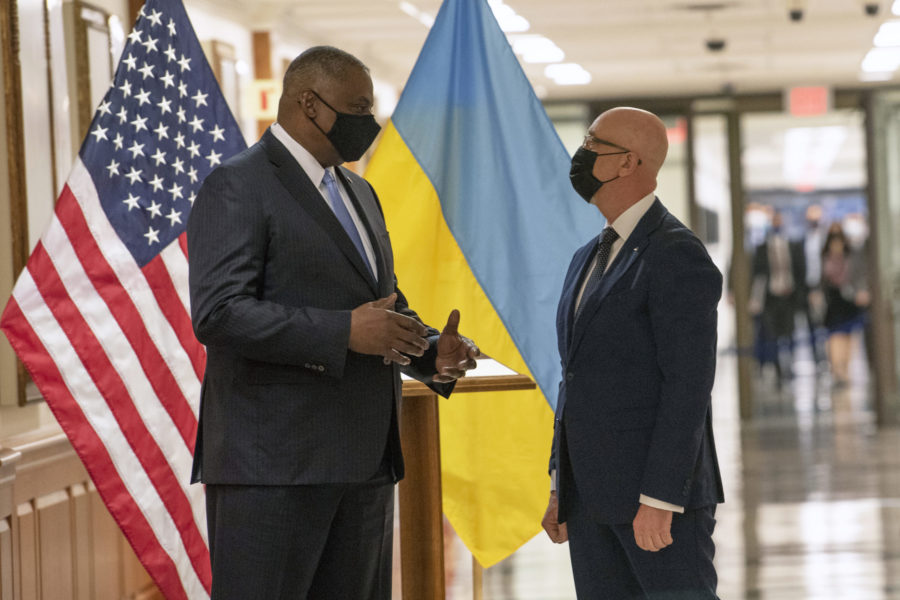Ukrainian Minister of Defense Oleksii Reznikov said Defense Secretary Lloyd J. Austin III promised his “unwavering” support to deter Russian aggression as border tension builds. Reznikov also confirmed Nov. 19 that Ukraine requested additional U.S. foreign military sales for its air and naval defenses.
“We have to defend our air and sea,” the defense minister said at a press conference at the Embassy of Ukraine in Washington, D.C.
Reznikov said Russia is using hybrid warfare, including helping Belarus push migrants across the European border, to destabilize the region and distract Eastern European NATO members Lithuania and Poland. Russia also holds Ukraine’s energy security hostage with the recently completed Nord Stream 2 pipeline that will allow Russia to circumvent Ukraine and cut off gas access, if it chooses.
The new Ukrainian Defense Minister met with Austin for the first time at the Pentagon Nov. 18 during yet another tense period in Ukraine’s ongoing war with Russia. This time, Russia’s unexplained actions could spell imminent invasion, prompting Reznikov’s last-minute trip to Washington just a month after Austin visited Kyiv. It is estimated that Russia has amassed up to 90,000 troops on Ukraine’s eastern border near the Ukrainian capital.
“We have a well-developed and a powerful land force. The need is an air defense and missile defense,” Reznikov said.
The defense minister said the U.S. Congress and Defense Department have voiced their backing of Ukraine’s territorial integrity and that a DOD team will travel to Ukraine to assess the country’s needs.
“I got a very strong position from Secretary Austin that they will be shoulder and shoulder with us, Ukraine,” Reznikov said in response to a question from Air Force Magazine.
The defense minister, nonetheless, acknowledged that arms sales require State Department and congressional approval.
“Not only Secretary Austin would be deciding—it’s also a political decision,” he added.
A State Department spokesperson declined to confirm to Air Force Magazine on Nov. 19 that such a letter of intent had been received from Ukraine but provided a list of the $2.5 billion in training and equipment assistance provided to Ukraine since 2014.
The assistance includes tactical unmanned aerial vehicles, satellite imagery and analysis support, counter-battery radars, and night vision devices and thermal scopes, which are used by front-line troops defending against Russian-backed separatists and elite Russian sniper units.
At the Pentagon on Nov. 18, Austin voiced his support to Ukraine, echoing a message President Joe Biden conveyed to Ukrainian President Volodymyr Zelensky during an August visit to Washington.
“Our support for Ukraine’s self-defense, sovereignty, and territorial integrity is unwavering,” Austin said. “We are monitoring closely recent Russian military movements near your borders, and we’ve made clear our concerns about Russia’s destabilizing activities and our desire for more transparency.”
A History of Support
Reznikov said in his comments at the Ukrainian Embassy that more than $200 million in annual assistance from the United States has followed the same pattern: Russian aggression matched by U.S. capabilities.
First, he said Russia posed a land threat with its tanks on the southeastern border in the Donbas region, where a low-intensity conflict continues with Russian-backed separatists. The U.S. response was to provide Javelin anti-tank missiles.
Russia then intercepted sensitive military communications, and the U.S. provided high-tech communications equipment. In 2020, Russia’s rapidly expanding Black Sea navy fleet began incursions into Ukrainian territorial waters, and the United States provided Mark VI and Island-class patrol boats.
Now, Russia is positioning attack helicopters and fighter jets near the border to complement its robust anti-access/area denial (A2/AD) systems in place in occupied Crimea. That’s why the U.S. team will travel to Ukraine to assess its defense needs.
The defense minister declined to describe the specific foreign military sales requests made but confirmed that a letter had been conveyed to the State Department.
Reznikov also said a frank discussion with Austin at the Pentagon confirmed intelligence that Russia was building up troops for exercises and leaving behind military hardware and weaponry for future use.
The defense minister also said he was confident the U.S. would stand with Ukraine to deter a Russian invasion.
“The main idea is that to stop aggression, we need to show clearly that the cost will be too high,” he said, noting that he previously spent two years as a negotiator with Russia and he knows that members of the Russian government are pragmatic.
Chairman of the Joint Chiefs of Staff Gen. Mark A. Milley spoke to his own Ukrainian counterpart, Commander-in-Chief of the Armed Forces of Ukraine Lt. Gen. Valerii Zaluzhnyi, after the Pentagon meeting Nov. 18.
“We’re going to ensure this communication on a regular basis,” Reznikov said of that meeting.
Biden has long pressed Ukraine to crack down on corruption and increase transparency in its institutions. The defense minister took pains to assure the U.S. that Ukraine has made strides in reforming its defense apparatus and coordination between the president, parliament, and Ministry of Defense.
“My personal task is to ensure the implementation of comprehensive reforms for the development of the armed forces,” Reznikov said, citing reforms in personnel management, acquisitions, and social issues, including housing and compensation of service members.
Reznikov deflected a question about NATO entry, saying path to entry was a political decision that depended on all 30 members of the alliance and that such a decision was not on the NATO agenda.
During his August visit to Washington, Zelensky told Biden that Russia’s aggression was an urgent threat. Ukraine and the U.S. signed a defense strategic framework, but at a Mount Vernon event Aug. 31, Zelensky told Air Force Magazine the framework was too vague.
“This is just the direction, the framework,” he added. “I need more substance.”
Reznikov said Nov. 19: “My task today is to provide substance to this agreement and to implement its provisions.”

